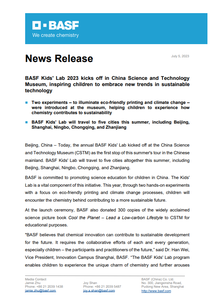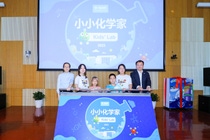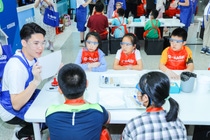Media
BASF Kids' Lab 2023 kicks off in China Science and Technology Museum, inspiring children to embrace new trends in sustainable technology
- Two experiments – to illuminate eco-friendly printing and climate change – were introduced at the museum, helping children to experience how chemistry contributes to sustainability
- BASF Kids' Lab will travel to five cities this summer, including Beijing, Shanghai, Ningbo, Chongqing, and Zhanjiang
Beijing, China – Today, the annual BASF Kids' Lab kicked off at the China Science and Technology Museum (CSTM) as the first stop of this summer's tour in the Chinese mainland. BASF Kids' Lab will travel to five cities altogether this summer, including Beijing, Shanghai, Ningbo, Chongqing, and Zhanjiang.
BASF is committed to promoting science education for children in China. The Kids' Lab is a vital component of this initiative. This year, through two hands-on experiments with a focus on eco-friendly printing and climate change processes, children will encounter the chemistry behind contributing to a more sustainable future.
At the launch ceremony, BASF also donated 300 copies of the widely acclaimed science picture book Cool the Planet – Lead a Low-carbon Lifestyle to CSTM for educational purposes.
"BASF believes that chemical innovation can contribute to sustainable development for the future. It requires the collaborative efforts of each and every generation, especially children – the participants and practitioners of the future,” said Dr. Han Wei, Vice President, Innovation Campus Shanghai, BASF. “The BASF Kids' Lab program enables children to experience the unique charm of chemistry and further arouses their curiosity and spirit of exploration through hands-on experiments. This is of great importance to not only nurture the growth of children but also protect the earth."
Qi Xin, Director of Exhibition and Education Center of CSTM, stated, "For more than two decades, BASF Kids' Lab has been a popular science education program among children and their parents. We will join hands with BASF in this summer to continuously promote science education among children through hands-on experiments that are close to current social issues and cultivate a spirit of inquiry-based learning. We look forward to further collaboration with BASF in future to carry out more innovative science education activities."
The BASF Kids’ Lab program was introduced to China in 2002 to support science education for children, attracting more than 200,000 children by the end of 2022. During this period, BASF also recruited and trained thousands of volunteer teachers, many of whom participated in the BASF Kids’ Lab program when they were still children. This year, a group of dedicated volunteer teachers, comprising more than 50 university students from esteemed universities such as Peking University, Zhejiang University, Beijing University of Chemical Technology, Ningbo University, and Southwest University will guide children in completing experiments.
The 2023 BASF Kids’ Lab experiments to be staged at CSTM include:
Magic Ink (45-min workshop, suitable for ages 6-12)
Printing, one of the remarkable inventions of ancient China, has created conditions for the widespread dissemination and exchange of knowledge and is now inseparable from daily life. This year, Dr. Bubbles will lead children as they learn about the essential wetting and adhesion stages in the printing process and use handmade ink to print patterns on plastic folders to experience the magic of printing together.
Cooling Experience (45-min workshop, suitable for ages 6-12)
Global warming is a severe problem facing humanity today. In this experiment, children will make a cooling layer for ice water, build a simple electric cooling circuit, and make a gel that changes color with temperature fluctuations to allow them to experience the impact of temperature changes firsthand. It is expected that children will understand the importance of sustainable development, take action with a low-carbon lifestyle, and help "cool" the earth.
About BASF in Greater China
BASF has been a committed partner to Greater China since 1885. With large production sites in Shanghai, Nanjing, Chongqing and Zhanjiang, as well as a regional research and development hub in Shanghai, BASF is a major foreign investor in the country's chemical industry. BASF posted sales of approximately €11.6 billion in 2022 to customers in Greater China and employed 11,411 people as of the end of the year. For further information, please visit www.basf.com/cn.
About the China Science and Technology Museum
China Science and Technology Museum is the only comprehensive museum of science and technology at the national level in China. It is a large-scale science popularization facility for the implementation of the national strategy of invigorating the country through science and education and strengthening the comprehensive national power of the country by relying on talented people, as well as for the enhancement of the scientific literacy of the general public. Since its opening over three decades, the museum attracts more than 63.28 million visitors. In order to take the lead in the development of science and technology museums nationwide, activities namely Science Wagon, Mobile Science and Technology Museums, and Thematic Travelling Exhibitions are held by the China Science and Technology Museum. Through these activities, the China Science and Technology Museum has laid a solid foundation for the development of a modern science and technology museum system. Further information on the China Science and Technology Museum is available at www.cstm.org.cn.


